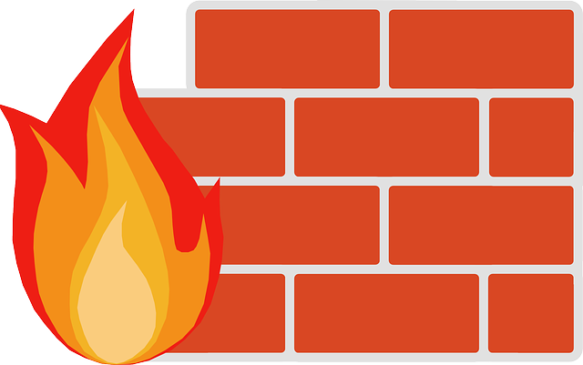A firewall is a cyber-security software program or hardware device which companies install on business database network servers. Its basic function is to monitor all incoming and outgoing web traffic to the network servers. Various types of firewall are available that work in accordance with the security policies the corporate enterprises implement to protect vital business data from potential cyber-threats.
Cyber-threats can be in the form of:
- Malware, ransomware and various other kinds of man-made computer viruses,
- Malicious websites or email attachments which the companies’ employees might unintentionally open,
- Various types of encrypted software threats cyber-criminals might send via the Internet, and
- Hacking by nefarious cyber-criminals or discontent employees to leak the companies’ vital data to the highest bidder.
Why do companies need to install firewalls?
Every computer, laptop or smartphone the employees of these companies use has an in-built interface. The user-interface, which might be in the form of a plugin, wire, computer application or wireless device connects them to network servers. The companies even have several other connections which link their information technology (IT) infrastructure to the Internet.
Without proper cyber-security measures in place, this entire IT infrastructure is susceptible to potential cyber-security threats. Cyber-criminals can easily launch these attacks from any location via the Internet without the risk of detection. This results in serious data breaches for the companies which can ruin their finances and market reputation.
By installing the latest firewall in both their business networks and other IT infrastructure, companies can:
- Use the mechanism to filter all incoming Internet data before allowing it pass to through their network servers.
- Create a barrier to monitor and regulate all online data traffic to the network servers
- Analyze all online users’ requests to access the information available on networks in accordance with companies’ cyber-security policies,
- Deny information on the business network servers to those employees who do not have requisite access privileges, and
- Block access to all suspicious websites and email attachments that employees might unintentionally download via the Internet.
How do firewalls work?
The firewalls companies install and operate on business network servers recognize all incoming data traffic by their Internet Protocol (IP) addresses. Most of this information is in the form of online user requests from the corporate enterprises’ stakeholders. They can be employees, managers in-charge of various departments, senior-level executives, directors, trading partners or customers. All types of firewall have an in-built access-control feature to determine which online requests to block or transmit to servers. Generally, the companies’ IT personnel or the reliable managed service providers regulate this access-control feature. Enterprises implement their security policies, rules and employees’ access privileges through this attribute. Using the firewalls, companies can:
- Grant access to all external online traffic to the network servers except those IP addresses that are specifically blocked, or
- Close the business network servers to all external incoming Internet traffic apart from those whose IP addresses they permit.
Both of these security measures aim at permitting, restricting or blocking external incoming Internet traffic to the network servers.
Types of Firewall
The firewalls companies choose to install on the business network servers and IT infrastructure fall under the following categories:
- Packet-filtering firewalls
This firewall establishes a checkpoint at the network servers’ online traffic router. It inspects all incoming data packets entering the router to access the network servers. The firewall looks for specific information the data packets contain without conducting an in-depth search. These include origin IP address, destination IP address, packet type and port number.
- Circuit-level Gateway
These firewalls instantly approve or block access of all external incoming data to the business network servers. These cyber-security mechanisms verify the transmission control protocol (TCP) handshakes initiating data transmission session. This is an automation process where both the end-users and network servers authenticate one another before commencing data exchange. However, the firewalls do not check individual online data packets throughout the session.
- Stateful Inspection Firewalls
The firewalls falling under this version integrate transmission control protocol (TCP) verification with technology of the packet-filtering variety. This offers a greater level of security when monitoring and filtering all external incoming data to network servers. However, these firewalls generally consume significant amount of computing resources and slow down the transmission session of legitimate data packets.
- Proxy firewalls
Unlike above three versions, proxy firewalls function only at the application level. The firewalls monitor and analyze the data transmission to servers according to their access-control features. It ensures the content of the information satisfy specific cyber-security conditions at both the packet and TCP handshake protocol level. However, if the data contains any kind of malware, the firewall blocks it.
- Next-Generation Firewalls
Next-generation firewalls are an improvement over the traditional packet-filtering, circuit-gateway and stateful inspection versions. These firewalls open up and inspect all incoming external data packet attempting to access the network servers. It looks for potential violations of the companies’ cyber-security policies and any malicious content within the data packets. Then, the firewall initiates the process to block it. These databases even threat intelligence features to ensure robust data scanning.
The business network services of all companies are vulnerable to potential cyber-threats like data beaches. These enterprises formulate and implement their own cyber-security policies to safeguard their vital business data in these servers. Installing and operating a firewall is a convenient cyber-security solution companies can adopt to achieve this objective.
However, it is prudent for them to conduct in-depth feasibility analysis on the various types of firewall and which one best suits your environment before making any decisions. The firewall they shortlist for their businesses should be cost-effective and easily integrate into their IT infrastructure. Moreover, this solution should be compatible to adapt and use the latest technology. Above all, it should provide adequate protection from all cyber-security threats round-the-clock 24/7 x 365 days.





